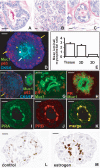DNA replication licensing and progenitor numbers are increased by progesterone in normal human breast
- PMID: 19342456
- PMCID: PMC2703536
- DOI: 10.1210/en.2008-1630
DNA replication licensing and progenitor numbers are increased by progesterone in normal human breast
Abstract
Proliferation in the nonpregnant human breast is highest in the luteal phase of the menstrual cycle when serum progesterone levels are high, and exposure to progesterone analogues in hormone replacement therapy is known to elevate breast cancer risk, yet the proliferative effects of progesterone in the human breast are poorly understood. In a model of normal human breast, we have shown that progesterone increased incorporation of 5-bromo-2'-deoxyuridine and increased cell numbers by activation of pathways involved in DNA replication licensing, including E2F transcription factors, chromatin licensing and DNA replication factor 1 (Cdt1), and the minichromosome maintenance proteins and by increased expression of proteins involved in kinetochore formation including Ras-related nuclear protein (Ran) and regulation of chromosome condensation 1 (RCC1). Progenitor cells competent to give rise to both myoepithelial and luminal epithelial cells were increased by progesterone, showing that progesterone influences epithelial cell lineage differentiation. Therefore, we have demonstrated that progesterone augments proliferation of normal human breast cells by both activating DNA replication licensing and kinetochore formation and increasing bipotent progenitor numbers.
Figures






Comment in
-
Finally! A model for progesterone receptor action in normal human breast.Endocrinology. 2009 Jul;150(7):2988-90. doi: 10.1210/en.2009-0383. Endocrinology. 2009. PMID: 19549883 Free PMC article. No abstract available.
References
-
- Howard BA, Gusterson BA 2000 Human breast development. J Mammary Gland Biology Neoplasia 5:119–137 - PubMed
-
- Ismail PM, Amato P, Soyal SM, DeMayo FJ, Conneely OM, O'Malley BW, Lydon JP 2003 Progesterone involvement in breast development and tumorigenesis—as revealed by progesterone receptor “knockout” and “knockin” mouse models. Steroids 68:779–787 - PubMed
-
- Clarke CL, Sutherland RL 1990 Progestin regulation of cellular proliferation. Endocr Rev 11:266–301 - PubMed
-
- Pike MC, Spicer DV, Dahmoush L, Press MF 1993 Estrogens, progestogens, normal breast cell proliferation, and breast cancer risk. Epidemiol Rev 15:17–35 - PubMed
-
- Santen RJ 2003 Risk of breast cancer with progestins: critical assessment of current data. Steroids 68:953–964 - PubMed
Publication types
MeSH terms
Substances
LinkOut - more resources
Full Text Sources
Other Literature Sources
Medical
Molecular Biology Databases
Miscellaneous

